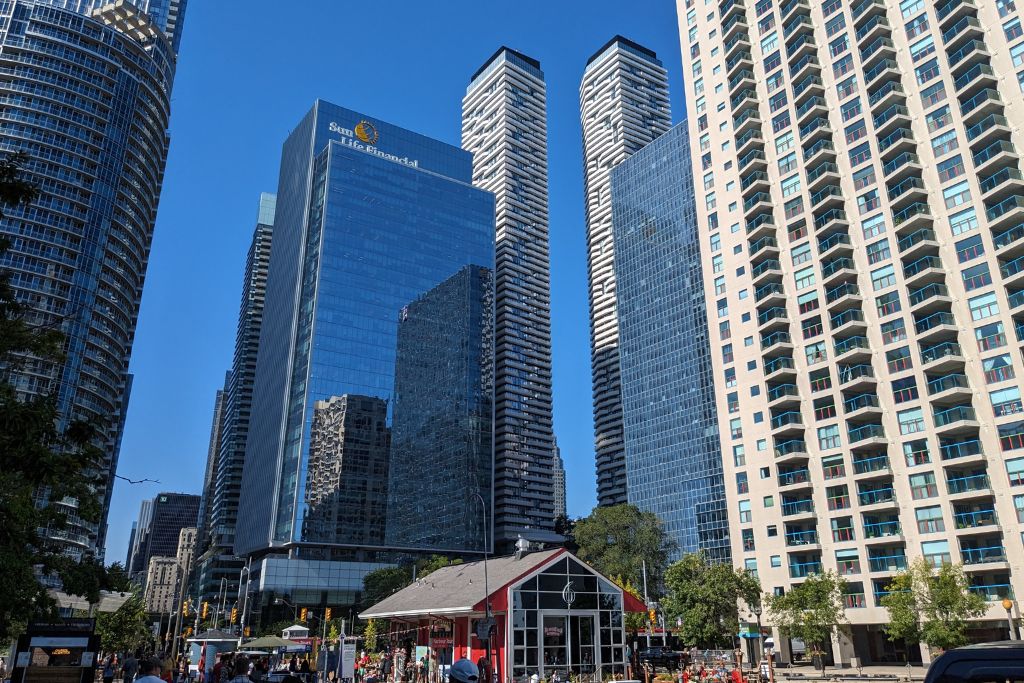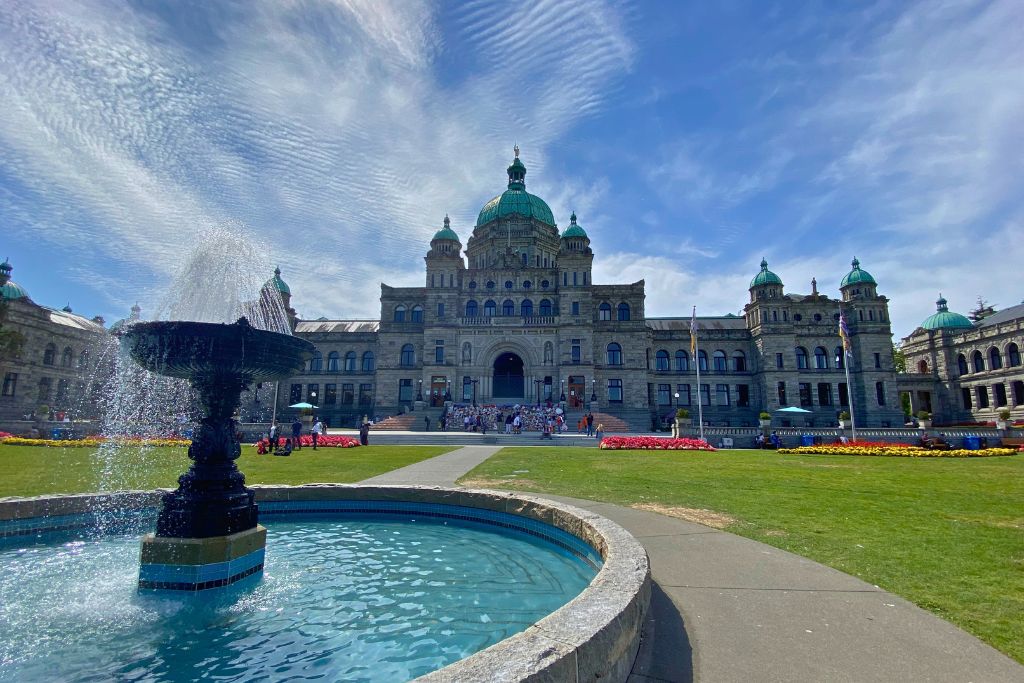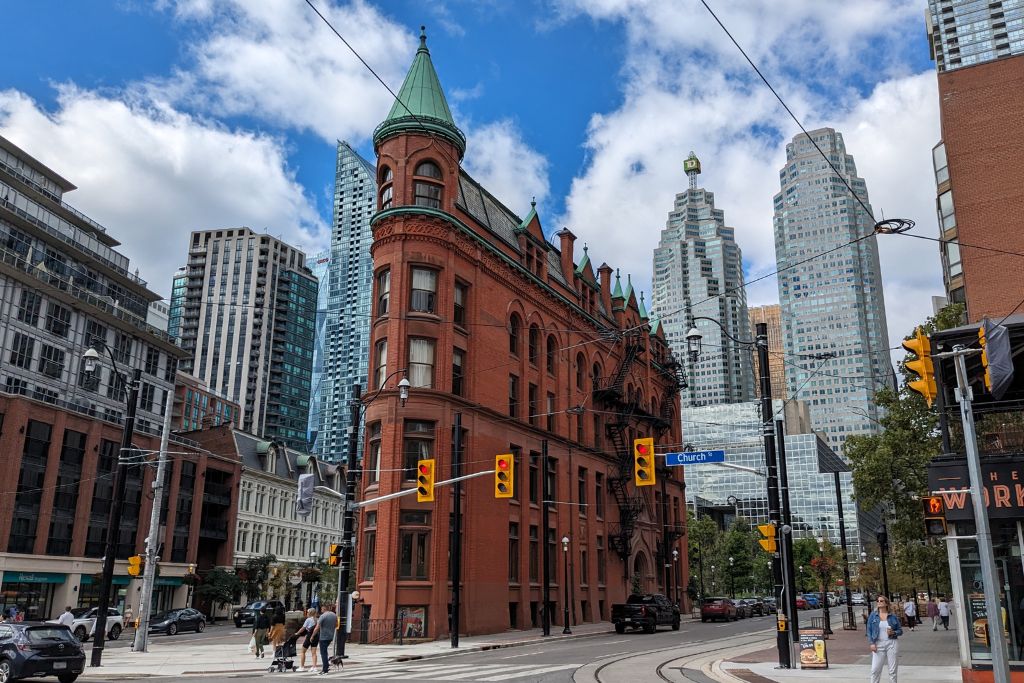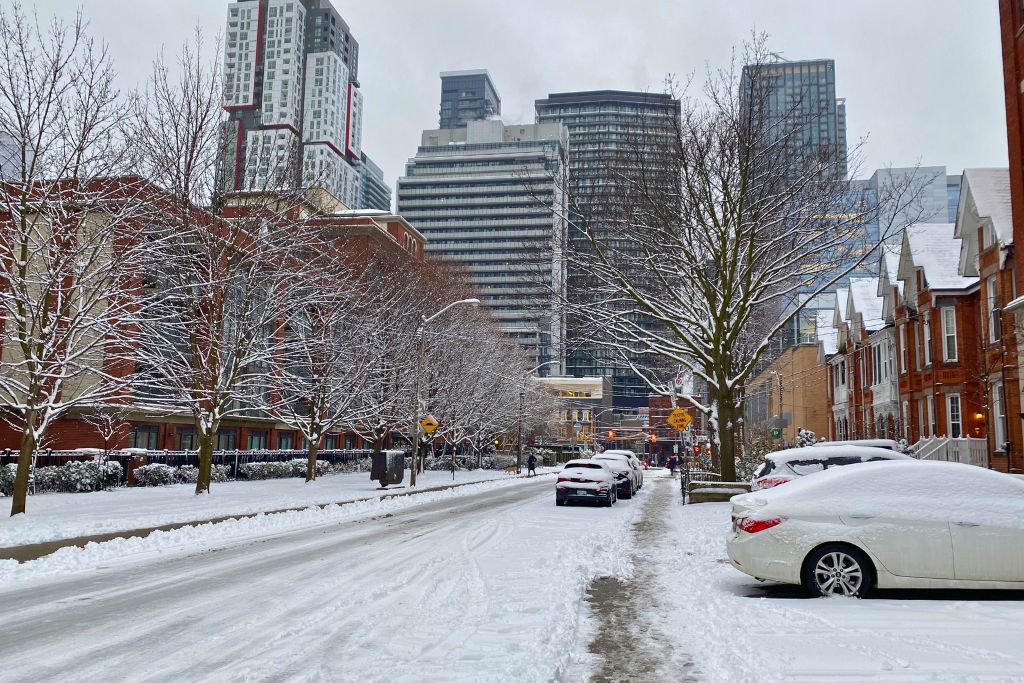50 Pros and Cons of Living in Canada (From an Expert)

Are you wondering what the pros and cons of living in Canada are?
Moving abroad is a big step, with lots of advantages and disadvantages to consider, no matter the country. Luckily, if you’re thinking about moving to Canada then you’ve come to the right place. Below, you’ll find the biggest pros and cons of living in Canada, which you should weigh up when making your decision.
How do I know all of this? I’m an expat myself, having lived in Canada since 2018, after spending most of my life living in different countries all around the world. So, I definitely know what Canada’s pros and cons are compared to other countries.
Plus, I currently live in Ontario, but I’ve also spent plenty of time travelling and working in Canada’s other provinces. So, I know what the advantages and disadvantages are across the country, not just on the east coast.
And, on top of this, I’m an ex-Canadian immigration lawyer! This means that not only do I have experience living in Canada myself, but I’m also an expert on moving to Canada.
So, if you’re curious about moving here, read on to find out what the pros and cons of living in Canada are!

Quick Overview – Pros and Cons of Living in Canada
Before we dive into more detail, here is a quick overview of the biggest pros and cons of living in Canada:
| Pros of Living in Canada | Cons of Living in Canada |
|---|---|
| Beautiful and diverse landscapes | Cold winters |
| Free healthcare and education | Housing is expensive |
| High quality of life | High cost of living |
| Strong economy | Competitive job market |
| Friendly and welcoming people | Domestic travel can be difficult |
| Safe and stable environment | High taxes |
| Multiculturalism | Difficult immigration processes |
| Social services and benefits | Challenges for newcomers |
| Modern and progressive | Few big cities |
| Four distinct seasons | Bugs and wild animals |
| Recreational activities | French skills may be required |
Pros of Living in Canada
1. It’s a Beautiful Country
To start off the list, and possibly the most obvious pro of living in Canada, is that it’s an absolutely stunning country. This is actually the main reason I was inspired to move to Canada, and I assure you it does not disappoint!
From Western Canada’s dramatic Rocky Mountains, to the rugged coastlines of Newfoundland and the majestic Niagara Falls in the east (and everything in between), Canada is a country rich in natural beauty.
Plus, Canada is such a huge country, so most of its natural landscapes are completely untouched. This means that when living here you’ll never be far from pristine and remote wilderness, to truly immerse yourself in nature.
And, on top of the stunning landscapes, Canada also has some beautiful cities. For example, Vancouver is known for its magnificent coastal mountain backdrop, Quebec City has endless historic cobble-stone streets, and Victoria is full of British charm.
So, no matter where you choose to live in Canada, you’ll always be surrounded by beauty.

2. Free Healthcare
One of the best things about living in Canada is without a doubt that healthcare is free!
Canada’s universal healthcare system makes sure that all residents have access to essential medical services without financial burden. This applies to citizens, permanent residents, and most work permit holders.
This means that there’s equality of care for everyone, and no crippling debt if you get sick.
Although many other countries also have free healthcare, Canada’s universal healthcare is definitely one of the best. In my experience living around the world, I’ve found that Canada’s healthcare system has the best level of care for free.
Since moving here, I’ve consistently been impressed with the attention I’ve received from doctors, the short wait times, and the fact that I never have to pay anything!
3. A Strong Economy
Canada is a wealthy country. In fact, it has one of the strongest economies in the world!
Due to its significant mining and natural resources industry, booming real estate market and large financial services sector, Canada boasts a resilient and diversified economy, known for its stability and opportunities across various industries.
And, as Canada is mostly a free-market economy, it’s somewhere where new businesses can thrive. So it’s a great place for business-minded individuals to base themselves.
On top of this, there’s low unemployment and a steadily increasing average household income, which are some of the biggest pros of living in Canada.
4. Lots of Job Opportunities
Along with a strong economy comes a thriving job market, and Canada is no exception. And with labour market shortages across a wide range of industries, there are plenty of job opportunities in Canada for workers of all different skillsets.
Some of the most in-demand jobs in Canada at the moment are healthcare workers, accountants, administrative assistants, web developers, truck drivers, pharmacists, data analysts, and sales and customer service representatives.
The skills shortage in these (and many other) industries means that not only are there plenty of jobs to apply for in Canada, but that immigrating to Canada is often easier for those with the right work experience, such as through Express Entry.
In my experience working in Canada, I have also found that if you’re good at what you do, it’s relatively easy to progress and take on new opportunities to develop and diversify your skillset. Canadian employers really tend to value hard workers. As such, they’re often willing to invest time and money into helping you reach your career goals.
5. Good Work-Life Balance
On the topic of employment in Canada, another pro of living here is that there’s excellent work-life balance. This was actually one of the things I was most surprised (and impressed) by when I first moved to Canada.
Of course, there are some professions which have better work-life balance than others. From my experience, working in law in Canada did not have great work conditions. But positions I’ve held in the financial and public sectors did. And most people I know in other industries, like marketing, tech, and customer service, also have good balance.
Overall, most jobs in Canada have healthy work hours and reasonable expectations, even in big cities like Toronto.

Generally, Canadian employers stick to a 7.5 hour work day with a lunch break, which employees actually take (unlike the UK, where we were expected to eat at our desks)! And regular work hours in Canada tend to be 8am to 4pm, 9am to 5pm or 10am to 6pm, depending on the employer and the employees preferred hours.
The vacation allowance you can expect to receive in Canada isn’t the most generous in the world. You can expect to receive between 2 to 4 weeks per year). However, some companies will give extra time off around long weekends and over Christmas, on top of your regular leave. And there are 8-12 public holidays (depending on the province) which are relatively evenly spread out throughout the year.
Plus, in the summer, many companies have ‘summer hours’ on Fridays, letting you finish at lunchtime so you can get a head start on the weekend!
6. Generous Social Services and Benefits
Free healthcare isn’t the only government benefit Canadians get to make the most of. Canada also offers its residents excellent social services and assistance.
During times of need, citizens and permanent residents are eligible for generous government benefits, such as Employment Insurance (EI) for those who are unable to work through no fault of their own, disability benefits, and financial aid and support for students, families and retirees,
Plus, Canada has a generous maternity and parental leave policy, which provides financial support for up to 18 months, so parents can take time off work to care for a new baby when growing their family.
7. It’s a Safe Country
One of the key factors to consider when choosing somewhere to live is safety. And one of the biggest pros of living in Canada is that it’s a very safe country!
Canada is consistently ranked as one of the safest countries in the world, along with a number of European countries, like Iceland, Denmark and Switzerland. Even Canada’s big cities, such as Toronto, are safe. Personally, I have always felt safe living here, and while travelling all around Canada.
The safe environment in Canada is due to low crime rates and a stable political climate. And, the country has a strong police force which is easy to contact and generally quick to respond.
However, this doesn’t mean that you should be completely carefree when it comes to your safety. Like anywhere in the world, Canada still has some crime, so you should nonetheless apply common sense when visiting or living here.
In particular, petty crime like bicycle theft, shoplifting and scams are relatively common in Canadian cities. And although these crimes may not necessarily affect you, it’s still best to be aware of them and exercise some caution.

8. Stable and Progressive Environment
Something else that contributes to Canada’s liveability and safety is the fact that it’s a very stable and progressive country.
Canada’s political system is based on democratic principles, respect for the rule of law and peaceful transitions of power. And the Canadian government is known for its progressive social policies, such as advocacy for feminism, environmental policies, and ambitious immigration targets.
Of course, this isn’t to say that Canada’s political system is perfect. And you may well disagree with some (or many) of the country’s policies. But, at the very least, Canada provides a reassuring environment for residents seeking a reliable framework of governance and civic engagement.
9. Excellent Education
Until recently, Canada was actually the most educated country in the world, now only being surpassed by South Korea!
As such, Canada has an excellent education system with fantastic public and private schools, and some of the world’s best higher education and research facilities. As a result, Canada has become one of the most popular destinations in the world for international students.
And, for families, a huge benefit of living in Canada is that the government subsidizes the public school system from kindergarten through to high school. This means that there’s free education for citizens and permanent residents up to the age of 18!
10. High Quality of Life
As a result of Canada’s financial strength, safe and stable environment, excellent education and employment opportunities, and easy access to public services, nature and much more, the standard of living in Canada is very high. This is of course one of the main draws to living in Canada!
In fact, Canada consistently ranks towards the top of lists of countries with the best quality of life around the world. These rankings are determined based on factors like safety, economic and political stability, affordability, healthcare, education, and pollution and climate.
While it can take some time to find your feet when you first arrive in Canada, don’t let this put you off. Once you settle into a community here and secure a job, you’ll quickly start enjoying the Canadian quality of life.

11. Four Distinct Seasons
Although Canada does get cold, one of the best things about living here is having different seasons. Canada is fortunate enough to experience four distinct seasons, each with something special to look forward to!
In summer in Canada you can expect long, warm days, with endless opportunities for outdoor recreation. Fall brings milder temperatures and vibrant autumn foliage, making it one of the absolute best times of year in Canada. In winter the country transforms into a white wonderland, with lots of fun cold-weather activities like skiing and ice skating. And spring is always an exciting season as the days get longer and the landscapes comes back to life.
Although having four seasons might not sound like anything special, it actually isn’t something you’ll find everywhere in the world. And this was actually one of the biggest reasons why I chose to move to Canada.
At the time, I was coming from Australia, which had almost permanent summer (bar a few weeks every year of slightly cooler weather in the height of ‘winter’). I was no longer enjoying the heat for 10 months of the year, so Canada’s varied seasons really appealed to me, and has been one of the best things about living here.
12. Diverse Landscapes
On top of being a beautiful country, another thing that’s so great about living in Canada is the diversity of the landscapes.
And you might not even be aware of all the different landscapes you’ll come across in Canada.
Not only are there huge mountain ranges with dramatic peaks and impressive glaciers, but there are also more than two million lakes, pristine beaches, awe-inspiring fjords, lush rainforests, picturesque wine regions, endless prairies, and even desert-like regions!
So, no matter what type of surroundings you prefer, it’s basically guaranteed that there’s a region in Canada that will suit you.
13. Easy Access to the Outdoors
On the topic of Canada’s amazing landscapes, another pro of living here is that no matter where you live, there’s always easy access to the outdoors.
Even Canada’s cities have tons of outdoor spaces to make the most of, including parks, ravines, forests, beaches and more. The cities also ensure there’s sufficient infrastructure for residents to enjoy the outdoors, such as bike paths, boardwalks and free outdoor sporting facilities like skating rinks, tennis courts and sports fields.
This is actually one of my favourite things about living in Toronto!
And, if you live in a more regional or rural location, you can expect nature to be right on your doorstep. So it’s always easy to get outside and enjoy some fresh air, no matter the time of year.

14. Tons of Recreational Activities
Along with access to the outdoors and diverse landscapes, comes a huge range of recreational activities to enjoy throughout the year.
And the cold weather doesn’t even stop residents from getting out and partaking in activities. Surprisingly, in my experience moving around the world, Canada is the most active and outdoorsy country I’ve ever lived in!
Canadian locals love partaking in sports and leisure activities, from joining clubs and sports leagues, to attending skills or fitness classes, playing games, or immersing themselves in art and culture. It’s not hard to find a recreational activity to suit your interests in Canada!
And Canadians also benefit from a wide range of seasonal activities, such as skiing, snowboarding and other snow sports in winter, and water sports, hiking, biking and fishing throughout the warmer months.
15. It’s a Very Multicultural Country
One of the biggest draws to living in Canada for many people is the fact that it’s a very multicultural society. This not only makes it a very welcoming place to immigrate to, but also a really interesting place to live!
In Canada you’ll find people of all different nationalities, ethnicities and religions living peacefully together. And Canada prides itself on this diversity, with multiculturalism being considered one of the things that makes Canada great.
As a result, newcomers to Canada are welcomed with open arms. And there’s very rarely any negativity surrounding immigration. Instead, in my experience, locals have always been curious and interested to learn more about different cultural backgrounds, where people have come from and what brought them to Canada.
16. Friendly People
The stereotype is true – Canadians are some of the friendliest people in the world!
Of course, not everyone you meet in Canada will be friendly. Unfortunately there are nice and not so nice people everywhere in the world. But overall, you can expect most Canadians to be respectful, polite and courteous, willing to help out, interested to learn about you, and to say sorry a lot (it’s funny but true!)
The friendly people in Canada make it a truly great country to live in. You’ll be able to make some great friends, get to know your neighbours, and be surrounded by people you can trust and rely on.

17. Welcoming and Inclusive Communities
The friendliness of Canadians isn’t just experienced from individuals, but also from communities as a whole.
Canada’s communities are welcoming and inclusive to newcomers, embracing people from all walks of life. Whether you’re in a large city or small rural town, you’ll quickly find a spirit of acceptance, tolerance and diversity that fosters a sense of belonging in Canada.
From cultural festivals and community events to grassroots initiatives, social clubs and sporting activities, Canada’s communities offer endless opportunities to connect with your neighbours.
You’ll also find a lot of different ethnic neighbourhoods in Canada. These can be ideal areas for newcomers who would prefer to be surrounded by locals with a similar cultural background. Plus they’re fantastic places to eat delicious authentic food!
18. It’s English Speaking
English is the most spoken language in the world and it’s also the most spoken language in Canada.
Although this might not seem like an important factor when considering somewhere to live, already knowing the local language makes a huge difference. And I speak from experience, having previously lived in countries where I didn’t already speak the language!
Chances are, if you’re looking to move to Canada, you’re either a native English speaker or you already speak English to a high standard. So you shouldn’t find it too difficult to communicate here.
But, if not, then luckily English is one of the easier languages to learn (compared to many other languages), as it’s relatively straightforward with streamlined grammatical structures. And, the government even offers new permanent residents free language classes upon arrival in Canada, so you pick up the language as quickly as possible.
19. Proximity to Other Countries
Canada might not be within as easy reach to other countries as most European countries are, but it is actually within proximity of some really fabulous places, and is exceptionally well connected to the rest of the world! This makes it a really convenient country to live in for travel.
Canada borders the US, so you can actually drive over the border to visit your neighbours to the south. And it’s only a short flight to some amazing tropical destinations such as Mexico and the Caribbean!
And if you prefer a European vacation, you can be in most European countries in around an 8 hour flight. Plus, there are direct flights from Canada to South America, Australia, Asia, the Middle East and Africa.

20. Modern Cities and Infrastructure
Canada is a very advanced country with modern cities and infrastructure. This affords residents more comfortable lifestyles, and increases the overall quality of life.
The country’s modern infrastructure ensures residents have access to world-class healthcare, education, transportation, workplaces, cultural attractions, entertainment and other facilities.
And, Canada has done an excellent job blending the old and the new. Montreal is a great example of this, seamlessly blending its old European charm with modern urban development. This has resulted in a vibrant and cosmopolitan city with excellent amenities, beautiful architecture, and interesting history and culture.
21. Lots of Festivals and Cultural Activities
As a country proud of its multiculturalism, Canada takes every opportunity to celebrate its rich cultural diversity!
Throughout the year, there are endless festivals, events and cultural activities across Canada, that showcase different communities, traditions, art, music and foods. In particular, throughout the summer you’ll find street festivals, fairs and other events every single weekend in most cities across the country.
Some of Canada’s biggest and best festivals and events to look out for are:
- The Calgary Stampede – The world’s largest rodeo, celebrated by partygoers over 10-days every July in Calgary.
- Montreal International Jazz Festival – The biggest jazz festival in the world, held annually in Montreal for 10 days at the end of June/beginning of July.
- Winterlude – Each February everything winter is celebrated for 3 weeks in Canada’s capital, Ottawa, with both indoor and outdoor events and activities.
- Toronto Caribbean Carnival (Caribana)– An annual parade and festival of Caribbean culture and traditions (and North America’s largest cultural festival) held in early August in Toronto.
- Toronto International Film Festival (TIFF) – One of the world’s largest and most prestigious film festivals, held every September in Toronto.
- Just for Laughs Montreal – The biggest comedy festival in the world, showcasing renowned and upcoming comedy acts in Montreal every July.
- Canadian National Exhibition (CNE) – Also known as ‘the Ex’, the CNE is Canada’s largest fair and community event, held annually in Toronto in August and early September.
- Pride Toronto – Held in Toronto every year in June, this is one of the world’s largest organized LGBTQ+ celebrations.
- Celebration of Light – On three nights every July Vancouver lights up with the world’s largest fireworks competition!
- Edmonton Fold Festival – One of the world’s leading Folk music festivals which takes places in August in Edmonton.
Also don’t forget about Canada Day on July 1st, which is celebrated across the country!

22. Excellent Air and Water Quality
Another advantage of living in Canada is that there’s excellent air and water quality across most of the country. In fact, the water quality has earned an “A” grade rating. And, according to the World Health Organization, Canada is consistently ranked as having some of the cleanest air in the world!
This is thanks to Canada’s vast landscapes, abundance of fresh water sources, and the country’s high standards of environmental protection.
With stringent regulations on pollution control, and conservation efforts aimed at preserving natural resources, there’s clean air to breathe, safe water to drink and pristine waterways for recreational activities. All of this contributes to Canada’s healthy and sustainable living environment.
23. It’s very LGBTQ+ Friendly
Canada has a reputation for being one of the most LGBTQ+ friendly countries in the world, due to progressive laws and policies that promote equality and inclusivity.
From anti-discrimination legislation, to marriage equality, Canada generally fosters a welcoming and supportive environment where people of all sexual orientations and gender identities can live authentically and without fear of prejudice or discrimination.
Of course, you might find this to be more true in some places in Canada than others. For example, bigger cities tend to be more progressive and inclusive than rural towns. But, overall, Canada is among the best countries for LGBTQ+ people to live.
Plus, Canada loves to celebrate diversity and inclusivity. So much so that Toronto’s annual Pride festival is one of the biggest LGBTQ+ events in the world!
24. Strict gun laws
Something which might seem a bit unusual to make the list, but which I, and many other Canadian residents deem to be a big pro of living in Canada, is that there are strict gun laws here.
This is something that really sets Canada apart from its neighbours to the south. And is actually a big factor to consider if you’re trying to decide between living in Canada or the US.
In Canada guns can only be legally owned for hunting or target shooting purposes, rather than self-defence. And, you need to be licensed to own a firearm. This is very different to the US where nearly half of households own a gun, almost anyone can easily buy a gun, and you can conceal-carry in many states.
The stricter gun laws in Canada make it a much safer place to live than the US. There’s much less gun violence, no mass shootings, and significantly lower crime rates overall.
25. Cannabis is Legal
Finally, if you’re someone who benefits from CBD and THC products for health and wellbeing, or you enjoy using cannabis recreationally, then Canada’s cannabis laws are a major advantage of living here!
Canada legalized and started regulating the sale and use of cannabis in 2018. Now, adults of legal age can legally buy and possess up to 30 grams of cannabis in Canada.
And the country as a whole has benefited from the legalization of cannabis, adding billions of dollars to the GDP, creating thousands of jobs, and decreasing drug-related criminal offences.
Buying cannabis in Canada is extremely easy with government-regulated cannabis shops on almost every street corner. And these stores are always very professionally run, with clean and modern environments, a wide range of products for recreational and medical uses, and friendly and knowledgeable staff.

Cons of Living in Canada
26. It Gets Very Cold
The most obvious and biggest con of living in Canada for most people is that it gets very cold. Temperatures usually stay below 0 throughout the winter, regularly dropping as low as -10°C to -20°C (14 to -4°F) plus wind chill. And, it can even get as cold as -30°C or -40°C (-22 to -40°F) in some places!
On top of the extreme cold temperatures, Canada also has a lot of snow and ice in the colder months, adding to the harsh conditions. This can make living in Canada difficult during the winter. Although there are also some pros to the cold weather.
Cold snowy weather means enchanting snow-covered landscapes, ice skating on frozen lakes, excellent skiing and snowboarding, and even white Christmases! Plus, it’s so nice to be cozy and warm inside by a fire when it’s cold and snowing outside.
On the downside, the extreme cold can impact daily life by requiring extra time and effort to stay warm, and do everyday things like going outside and navigating in icy conditions. The cold weather can also affect your mood and well-being by contributing to seasonal depression.
During my time living in Canada, I’ve experienced temperatures as cold as -35°C (-31°F) with the wind chill. But this was only for a couple of weeks during my first winter living in Toronto, which was an exceptionally cold year. And, with a good winter coat and boots, it wasn’t actually that bad. I’ve even been skiing in Canada in -20°C (-4°F) and was warm enough with the right gear!

27. High Cost of Living
The next major con of living in Canada is the high cost of living. Like much of the western world, Canada is expensive!
Canada is now ranked number 15 on the cost of living index. And everyday expenses like groceries, gas, insurance and utilities have been getting more and more expensive. Plus, Canada has some of the highest housing prices in the world.
The most expensive places to live are the major cities. Toronto tops the list as Canada’s most expensive city, closely followed by Vancouver. Mountain towns like Banff and Whistler are also known to have a high cost of living, due to a shortage of housing for locals and prices which are driven up by tourism.
Although it’s worth keeping in mind that the cost of living in Canada will vary significantly from person to person. Depending on where you live, what your lifestyle looks like, how big your family is, and how much money you earn, you may not find the cost of living in Canada to be particularly high.
And, there are also various social services and benefits available in Canada, such as free healthcare and subsidized childcare, which can help to offset living expenses.
28. Housing Prices Have Skyrocketed
On the topic of cost of living, another downside of Canada is that the cost of real estate has skyrocketed in recent years. This has made homeownership increasingly unaffordable for many. And, in turn, it continues to drive up the price of rent, making housing more expensive for everyone.
The average house price in Canada in 2024 is around $720,000 CAD, but this varies drastically by type of property, city and province. For example, the current benchmark price in Toronto is $1,113,600, compared to $597,600 in Calgary.
When it comes to rentals, a 1 bedroom condo in Toronto or Vancouver will currently set you back around $2,700 CAD per month, compared to $1,700 in Montreal or Calgary. Whereas, in a smaller city, like Edmonton, you could expect rent to be as low as $1,300 per month for a 1-bedroom unit.
With such drastic differences in the cost of housing across the country, this is definitely something to factor in when deciding where to live in Canada.
29. It Gets Dark Early in Winter
While summer days are very long in Canada, the daylight hours in winter are much shorter. And, with most of Canada observing daylight saving time, this means it gets dark very early in the colder months.
During the height of winter, there can be as little as seven hours of daylight per day! In the most populated places in Canada, the sun sets as early as 4:10pm in December! And the further north you go, the shorter the days get.
This means that if you work typical business hours, you won’t get to enjoy much daylight during the winter, as you’ll likely be leaving work after dark.
Although these very short days are only for 2-3 month of the year, the limited daylight hours is one of the main contributors to seasonal depression (also known as SAD – seasonal affective disorder). This can have a big impact on your mood and mental-well being and is an important factor to consider about living in Canada.

30. Immigrating Can be Difficult
While there are multiple pathways to obtaining residency in Canada, immigrating here permanently can be difficult for many. Obtaining a temporary work or study permit for Canada is one thing. But qualifying for and completing the permanent residency (PR) process is a whole other challenge.
Factors like your age, professional experience, education, language skills and marital status will affect your eligibility for PR. And if you don’t meet the minimum criteria, it will be almost impossible for you to stay here long term.
Plus, other factors can also lead to a denied application, such as a medical condition or criminal background, ties to inadmissible relatives, or failing to properly disclose information in your application.
On top of the strict requirements eligibility criteria, the process of obtaining PR in Canada is also lengthy and uncertain. From my experience working in Canadian immigration law, I’ve seen people wait as long as 2 years for a decision!
And many applicants are not eligible to continue working while waiting for their PR. This means that if you’re already living in Canada when you apply, you might be stuck without an income while waiting on your application to be processed. This can create very difficult living conditions for a sometimes lengthy period of time.
Are you looking to immigrate to Canada? If so, I recommend speaking to a Canadian immigration lawyer to help you get started with the process!
31. Prices Don’t Include Tax
As if things in Canada aren’t already expensive enough, the advertised prices for goods and services here also don’t already include sales tax. And with sales tax rates up to 15% in some provinces, this can actually increase the price by quite a lot!
The lowest sales tax you can expect to pay in Canada is just 5% in Alberta, Northwest Territories, Nunavut, Yukon. The other provinces are much higher, starting with Saskatchewan at 11%, BC and Manitoba at 12%, Ontario at 13%, Quebec at 14.975%, and New Brunswick, Newfoundland and Labrador, Nova Scotia and PEI all at 15%.
Advertising prices without tax feels like a marketing tactic which lures you in under the illusion that what you’re buying is cheaper than it really is. And it also means you’re constantly doing mental math every time you go out to eat or are shopping. Personally, I find this to be one of the most annoying things about living in Canada.
32. Big Tipping Culture
Just like the US, Canada has a big tipping culture. This means that when eating out, paying for a personal service, or ordering a takeaway, it’s expected that you leave a tip.
And this isn’t just a small token of appreciation. In Canada, the norm is to tip anywhere from 15-30%! This applies to everything from food and drinks to haircuts, beauty services, taxi rides, and even small items like coffee!
Generally, you would add 15% to the bill for average service, 18-20% for good service, and upwards of 20% if you were really impressed. However, on small orders like a takeout coffee or a drink at the bar, most establishments will have a jar on the counter for you to leave some change as tips. Depending on how fancy the drink is, $1 to $2 per drink is usually sufficient.
Once you factor in the price of tax and tips to your bill, this adds an extra 20-40% to the price, making eating and drinking out, or paying for services in Canada very expensive. So, it’s important to keep this in mind before deciding what to order, especially if you’re trying to stick within a budget.

33. The Job Market is Competitive
While Canada is a country with plenty of employment opportunities, the job market here is actually quite competitive. This is especially true for certain industries like law, technology and finance.
These particular industries are known to be difficult to get into in Canada. They often recruit through internship programs, or look for top talent at the university level, bringing them on as graduates to then progress through the ranks. Therefore, for a lot of these jobs, it’s best to pursue studies in Canada so you can partake in these entry level recruitment cycles.
Securing a job can also be especially difficult for newcomers in Canada, who don’t yet have any local work experience. Unfortunately a lot of Canadian employers won’t place as much value on international work experience when considering applications. And they can sometimes be hesitant to proceed with international applicants due to concerns about work rights in Canada.
To overcome this, I would recommend making sure your Canadian work status is clear on your application, and you have highlighted all relevant and transferable experience in both your CV and cover letter. It can also be helpful to work with a recruiter, as they will be able to reassure and explain to prospective employers why you’re well-suited to the job.
Luckily, once you get your first job in Canada it becomes much easier to find the next one! As soon as you have some local experience on your CV your application will be treated just like any other Canadian applicant. Or, you may even find yourself being headhunted for your next role!
34. Low Salaries in Certain Industries
In addition to certain industries being very competitive, another downside to Canada’s job market is that some jobs don’t pay very well.
Some of the lowest salaries in Canada are in the retail, accommodation and food services sectors. Although in service jobs you can make excellent tips, which more than makes up for the low hourly wage. I know people working in restaurants who make upwards of $1000 per week just in tips!
Additionally, the national minimum wage in Canada is only $16.65 CAD per hour. This is lower than several other countries, including Australia, New Zealand, the UK, Germany and the Netherlands.
I found the difference in salaries to be especially noticeable when I moved to Canada from Australia. The cost of living between the two countries is similar, but wages are significantly higher in certain industries in Australia. I also had several Australian friends who took big pay cuts in construction, marketing, customer service and administration roles when they moved to Canada.
Although keep in mind that not all jobs in Canada pay poorly! You will also find plenty of positions which pay much higher here than in other countries. In particular, you can earn very good money working in healthcare, law, tech, engineering and finance in Canada. But you should do your research before making the move, to get a realistic idea of what you will likely earn here.

35. High Taxes
One of the pros of living in Canada is that there are tons of social programs and benefits. However, this results in higher taxes than in many other countries.
Although high taxes are a downside of living here, most of us who live here agree it’s worth it for all the important social programs our taxes fund, such as healthcare, education and other social services.
While taxes vary by province, Canadians typically pay federal and provincial income taxes, as well as goods and services taxes (GST) or harmonized sales taxes (HST) on purchases.
Whether you pay GST or HST on goods and services depends on the province you’re in. But, overall sales tax can be as low as 5% in Alberta, Nunavut, the Northwest Territories and the Yukon, and as high as 15% in Nova Scotia and PEI.
As for income tax, in Canada you have to pay both federal income tax and provincial or territorial income tax. And these rates increase in increments based on how much money you earn.
The federal tax rates start at 15% for the portion of your income that is $55,867 or less, and go right up to 33% for anything over $246,752. Whereas the provincial/territorial tax rates range anywhere from 4% to 21% depending on your tax bracket and the province or territory you live in.
36. A Weaker Currency
On the topic of money, it’s also worth including that Canada’s currency isn’t as strong as you might think.
Of course, the Canadian dollar (CAD) is by no means a weak currency, but it is weaker than some of the world’s other economic leaders. The US dollar (USD), Euro (EUR) and Great British Pound (GBP) are all stronger than the Canadian dollar. And it actually only ranks as the 7th most traded and 6th most important reserve currency in the world.
Although this isn’t a big deal, the main reason why this is a con of living in Canada is that it can affect your purchasing power abroad. So you will want to keep an eye on the exchange rates before you travel, to try and get the best rate possible, to maximize your dollars.
37. Limited Number of Big Cities
If you’re a city person, then this one will apply to you. As such a huge country, with a relatively small population, there aren’t actually that many major cities in Canada.
In fact, Canada only has 6 cities with populations over 1 million people! Toronto is the largest, with nearly 6.5 million people in the metro area. This is followed by Montreal with 4.3 million, Vancouver with 2.7 million, Calgary with 1.7 million, and Edmonton and Ottawa with around 1.5 million people each.
Obviously this makes Canada a great place to live if you’re looking to escape the urban lifestyle. But, this also means that modern infrastructure and amenities are mostly concentrated to certain parts of the country. And there can be limited job prospects and services outside the major urban centres which, depending on where you choose to live, can make life more difficult.

38. There’s Always Construction
Something you’ll likely notice pretty quickly when you arrive in Canada is that there’s constant construction.
With a growing population and increasing demand for housing, there’s always a need for new residential development and infrastructure across the country. This is particularly noticeable in urban settings where it feels like new buildings are going up every week.
From my condo in Toronto I can even see several apartment buildings being built at the moment. And it feels like the skyline is constantly changing!
On top of this, due to the harsh winters, a lot of Canada’s road need to undergo regular maintenance and improvements. So, you’ll often encounter some form of road works, no matter where in Canada you’re driving.
While construction is essential for improving transportation networks, creating more housing, and upgrading amenities, it also leads to disruptions such as traffic congestion, noise and dust. But, ultimately, these projects are designed to improve quality of life for residents. So, although it can be annoying and inconvenient for now, this could actually end up being a pro of living in Canada in the long-term.
39. Domestic Travel is Expensive
Canada is a huge country with so many beautiful places to explore. And, moving here, you might be excited to do just that!
But, what you might not know is that it’s actually quite expensive to travel within Canada.
As it’s such a big land mass, domestic travel usually involves flying – often for 4 or 5 hours – and unfortunately there aren’t many budget airlines, so this can be pricy. Plus, high prices of real estate in Canada extend to temporary accommodation as well, meaning that hotels and holiday rentals are also very expensive, often costing hundreds of dollars per night.
As such, it can actually be much more affordable to just travel abroad for your vacation rather than travelling locally.
But, luckily, there are also some budget-friendly ways to explore Canada. With an abundance of pristine landscapes, Canada is a fantastic country to go camping. This is one of the best ways to keep your travel costs down and a great way to immerse yourself in Canada’s natural beauty. Plus, most of the must-visit tourist sights in Canada are found in nature, so they’re usually free (or cheap) to access.
40. Getting Around Can be Difficult
It’s not just that domestic travel is expensive in Canada, but it can also be difficult. And, on top of this, even getting around close to home can sometimes be hard in Canada.
As I already mentioned above, given how big the country is, travelling within Canada often requires flying for several hours. The most common alternative to flying is driving for hours and hours, or even days, depending on how far away your destination is.
To put it into perspective, driving from Toronto to Vancouver will take you around 45 hours of non-stop driving, covering 2,730 miles (4,395 kms)!
You can also get the train to a lot of different Canadian destinations, including travelling across the country. But there are limited options, and long-distance train travel also takes a long time and is very expensive.
To commute or travel locally, there are good roads and public transit options available. But these are easily disrupted due weather events like snow, and can get congested during peak times. This means it’s not always that easy to get from A to B, even when you’re not travelling far from home.

41. The Water is Cold for Swimming
Although a small detail, but for anyone who loves swimming, one con of living in Canada is that the water is often too cold for swimming.
In many parts of Canada, water temperatures stay cold throughout the summer months, making it too uncomfortable to swim. This is because most lakes freeze in winter and only finish melting by May or June. Plus, a lot of Canada’s lakes are glacial lakes, which means they are constantly being fed a stream of freezing water from the melting ice, keeping them cold.
And the ocean in Canada isn’t much warmer! Sea water temperatures will usually peak around 20°C (68°F), which is definitely warm enough for a refreshing dip, but you probably won’t want to swim for too long.
The best places for swimming in Canada are lakes in the south and central Canada at lower altitudes. Every summer I’m always surprised by how warm the water actually gets in Ontario. And a day at the beach is actually one of my favourite summer activities to do here!
42. Healthcare Can be Difficult to Access
One of the biggest pros of living in Canada is that there’s free healthcare. But, on the downside, health services can sometimes be difficult to access.
This is especially true for individuals living in remote or rural areas where there are limited medical facilities and healthcare providers. And I know this has also been an issue in seasonal towns, where services generally cater more towards tourism, rather than residents. This means that locals often have to travel to the closest city for medical treatment, which can be time consuming, inconvenient and expensive.
Something else which I found a bit frustrating when I first moved to Canada was that you’re meant to have a family doctor here. And getting one is actually more difficult than you might think!
Most family doctors don’t accept new patients, so you have to join a waitlist and wait for an opening to arise, which can take a really long time. Even in Toronto, where there’s an abundance of healthcare providers, I still had to wait several months to be accepted by a family doctor.
Luckily, if you don’t have a family doctor, you can still see a doctor at a walk-in clinic. The biggest downside to this is that they won’t be as familiar with your medical history and won’t usually prescribe you long-term medication or refills. This can be very inconvenient for patients who take medication regularly and have to keep going back to the doctor for new prescriptions.
43. Car Insurance is Expensive
One of the most surprising expenses I discovered when I moved to Canada was how high the cost of car insurance is. And it’s not just a little bit more expensive than other countries, it can be up to 10 times the price!
When I was living in Australia, my comprehensive car insurance cost me around $400 per year. For a similar car here in Canada, it would have cost me more than that per month! Luckily, since I live downtown I didn’t really need a car, so I put off getting one.
There are a few reasons why Canadian car insurance is so expensive. One of the main reasons is that there is harsher weather in Canada, which leads to a higher risk of accidents and damage. On top of this there’s also ineffective government intervention in the insurance industry in Canada, leading to insurers hiking up their prices as much as possible.
It’s also worth keeping in mind that car insurance in Canada is more expensive when you first arrive here. Unfortunately most Canadian insurers don’t take into account international no claims certificates and driving history for discounts. So, when you first start driving in Canada, you’re treated as a new driver all over again. So, insurance will be more expensive until you’ve accrued a few years of Canadian driving experience.

44. Terrible Phone Plans
Another very high expense in Canada is mobile phone plans. This is also largely due to a lack of government intervention and regulation, as well as communications companies operating on an outdated price-per-gigabyte model.
In other countries I lived in, I got used to paying a relatively reasonable flat-fee for unlimited calls, texts and data. So when I came to Canada it was quite a shock to find that I could only choose from a limited number of gigabytes, and my phone plan was going to cost me more.
To put it into perspective, for a similar price to what an unlimited phone plan in the UK costs, in Canada you can get unlimited national calls, but only around 10 gigabytes of data.
The good news is that this is starting to change. More budget mobile carriers have entered the market recently, which has put pressure on larger companies to offer more competitive phone plans. As a result, we’re starting to see larger data plans becoming available, and at more reasonable prices.
45. International Credit isn’t Recognized
Something that makes living in Canada more difficult when you first arrive is that international credit history isn’t recognized here. Although this might seem like a minor issue, it can actually add quite a few challenges to getting settled.
Firstly, when looking for housing, rental applications will always require you to show good credit history. Your Canadian credit report will initially show a very low credit score, which you will need to build up over a couple of years. And without good credit, many landlords won’t be willing to consider your application.
Although there are some ways around this. You could try providing your foreign credit report with a letter of explanation and hoping the landlord is willing to be lenient, offer to pay multiple months of rent up-front, or work with a realtor who can try and negotiate a solution on your behalf.
A lack of credit history can also make it difficult to get a credit card (you will likely only be approved for a few hundred dollars initially), take out loans and get car financing. But, fortunately things will keep getting easier the longer you spend in Canada accruing good credit.
46. High Shipping and Postage Costs
Another relatively small con of living in Canada, which is particularly annoying to expats, is that Canada has higher shipping and postage costs than other countries. This is largely due to the country being so vast, with a dispersed population and great distances between regions.
Since most correspondence is now done electronically, and online shopping orders will usually offer free or discounted delivery, this might not impact you on a day-to-day basis. However, when sending a package to or from Canada, you’ll really feel it.
Sending a small package up to 1 kg internationally from Canada will cost upwards of $26 CAD for the cheapest and slowest postage option, and almost $50 CAD to send it by international air mail.
And receiving packages to Canada isn’t cheap either. Not only is the postage itself expense, but the Canada Border Services Agency (CBSA) is also really strict when it comes to importing goods. This even applies to receiving gifts!
As such, on any items sent to Canada that are valued at over $60, the CBSA will usually require you to pay duty and taxes before they’ll release the package to you. And these fees often end up being way more than the value of the contents of the package.
So, if you move to Canada, don’t expect to receive too many care packages from friends and family back home!

47. There are Dangerous Animals
When you think of dangerous wildlife, places like Australia or Africa probably come to mind. But Canada also has its fair share of dangerous animals!
Canada is home to grizzly and black bears (and even polar bears in the north), moose, cougars, wolves, bobcats, coyotes, and even rattlesnakes.
While most of these animals will try to avoid you, it is quite common to encounter bears or moose while hiking, biking or driving in mountainous and forested regions. As they can be dangerous to humans if they feel threatened, it’s important to know what to do if you do encounter one. Therefore, I recommend reading up on Canadian wildlife safety before you head out on any outdoor adventures here, and always carry bear spray when hiking in bear country.
So far during my time in Canada I’ve had several close encounters with moose, which fortunately were not aggressive, but did interrupt our hiking plans and made for quite a thrilling experience. Whereas, luckily, I’ve only seen bears from a safe distance, and I hope to keep it that way!
48. A Long Bug Season
As Canada is typically considered a cold country, you probably don’t associate it with bugs. But Canada actually has a lot of these pests, and quite a long bug season!
In many parts of the country, bug season lasts the whole summer, starting as early as May, right through until the end of August. Although late spring the beginning of summer is generally the worst time, with an abundance of black flies, mosquitos and horse flies.
These pesky bugs can make outdoor activities unpleasant and sometimes even unbearable in Canada. Not only are they annoying, but they can really hurt when they bite, which can also lead to infection.
Last summer on a canoe trip in mid-July I counted more than a hundred black fly and mosquito bites on my feet and legs! Although it was still an incredible trip, it would have been even better if I wasn’t fighting off insects and suffering from itchy bites the entire time.
While bug repellents and protective clothing can help avoid insect bites, bug season is a challenging part of outdoor life in many parts of Canada, and can sometimes dictate when and what activities you will choose to do in the warmer months.

49. Alcohol and Cigarettes are Expensive
This one won’t apply to everyone, but for some people the cost of alcohol and cigarettes in Canada is a downside of living here.
Alcohol and tobacco products are expensive in Canada, compared with many other countries, as the government imposes significant taxes on these items. This is partially because the government makes a lot of money from the sale of these products. But the high prices are also aimed at discouraging consumption and mitigating the social and health costs associated with alcohol and tobacco use.
On one hand, this is actually a very good thing. But, on the other, it can create financial barriers for individuals with lower incomes or limited disposable income and negatively impact their spending habits.
While these high prices don’t impact me much, I do notice them when I go out for a drink or dinner. The price of a cocktail or a glass of half-decent wine is often around $18 to $20 these days, which is close to the price of a meal!
50. Part of the Country is French Speaking
Finally, something to consider when choosing where to live in Canada is that part of the country is French speaking. And that doesn’t mean that they speak both French and English in those regions. The province of Quebec is predominantly French-speaking, with French being the official language and a lot of people only speaking French.
This linguistic diversity does add to the cultural richness of the country. But it also presents big challenges for individuals who choose to live in Quebec but are not proficient in French.
While it is possible to get by in Quebec with minimal French, non-French speakers will encounter more difficulties in many day-to-day situations, such as accessing government services, finding employment, and integrating into francophone communities. As a result, the language barrier can make everyday life more difficult and create a sense of exclusion for non-French speakers living in Quebec.
FAQs
Is Canada a good place to live?
Yes, Canada is a fantastic place to live! It has a high quality of life, excellent education and work opportunities, free healthcare, a strong economy, beautiful landscapes, diverse communities and much more.
Although that doesn’t mean it will suit everyone. So whether or not Canada is a good place for you to live will largely depend on your personal lifestyle and preferences.
You can find out more about the advantages of living in Canada here.
What are the pros and cons of living in Canada?
Some of the major pros and cons of living in Canada are:
- Free healthcare (pro)
- High cost of living (con)
- A safe and stable environment (pro)
- Getting around can be difficult (con)
- Beautiful natural landscapes (pro)
- It gets very cold (con)
- Great education and job opportunities (pro)
- A competitive job market (con)
- Tons of recreational activities (pro)
- Limited number of big cities (con)
- Multicultural communities (pro)
- Immigrating can be difficult (con)
What are the downsides of living in Canada?
For most people, the biggest downsides of living in Canada are the high cost of living and cold winters. It can sometimes also be difficult to settle in when you move to Canada. In particular you may find it difficult to find a job and a home when you first arrive, due to the competitive job and housing markets.
To read more about the downsides of living in Canada, check out my top reasons not to move to Canada.
Where is the best place to live in Canada?
This really comes down to personal preferences and lifestyle. If you prefer city life then Toronto, Vancouver or Montreal will probably be the best fit for you. Whereas, for outdoor activities such as hiking and skiing or snowboarding, a mountain town in BC, Alberta or Quebec might suit you best.
You should always do your research before moving to Canada, to figure out where will be the best place for you. In deciding where to live, make sure to consider things like affordability, job opportunities, schools, amenities and recreational activities, as these will vary from place to place.
And don’t be afraid to try somewhere new if your initial destination doesn’t turn out to be everything you had hoped for. Sometimes it may take a couple of moves before you find your forever home in Canada.
Is it better to live in Canada than the US?
Canada usually ranks higher than the US for liveability and is generally considered to offer a better quality of life. This is largely due to Canada having lower crime rates, free healthcare, cheaper education and lower unemployment than the US. Plus, it’s an exceptionally immigrant friendly country.
However, whether Canada is a better place to live than the US will depend on your unique circumstances and preferences. For example, certain occupations pay a lot higher in the US than in Canada, so you may find that with your work and education background, your lifestyle will be better in the US.
Can I live in Canada if I’m a US Citizen?
You can only live in Canada as a US Citizen if you obtain a work or study permit, or pursue an immigration pathway.
Obtaining residency in Canada is the same process for all foreign nationals. Although one advantage US citizens may have is the Canada-United States-Mexico agreement. This agreement makes it easier for Americans with experience in certain professions to get Canadian work permits.
What is the quality of life like in Canada?
Canada’s quality of life is one of the best in the world. With free healthcare, low unemployment rates, individual freedom and political stability, Canada is consistently one of the highest ranked countries to live in for quality of life!
Is the cost of living in Canada expensive?
Yes, Canada does have a high cost of living. But, overall, this is generally comparable to other western countries like the US and Australia. And the cost of living will vary significantly depending on factors such as location, lifestyle, and family size.
Generally, major cities like Toronto, Vancouver, and Montreal, or tourist destinations like Whistler and Banff, tend to be more expensive compared to smaller cities and rural areas.
However, despite the high cost of living, Canada also provides various social benefits and services. Having access to things like free healthcare, employment insurance and subsidized childcare, can drastically help to offset the costs associated with living here.
Is Canada a safe place to live?
Canada is one of the safest countries to live in the world. It ranks 12th on the Global Peace Index and has relatively low crime rates, with a crime index score of just 41.89. Plus, even the country’s larger cities, like Toronto, are considered safe places to live.
However, keep in mind that nowhere in the world is completely safe, including Canada. And on top of the same safety risks you could face anywhere – such as petty crime – you may also encounter safety issues due to the weather in Canada. In particular, as the winters are often harsh, snow and ice can create dangerous conditions.
Can you move to Canada without a job?
Canada has various pathways for permanent and temporary residence. Certain work permits and immigration pathways do require you to have a job to move here. But others, such as study permits, working holiday visas and spousal sponsorship pathways do not depend on your employment status.
You can find information (including the eligibility requirements) for all of Canada’s temporary and permanent residency pathways on the Immigration Canada website.
How difficult is it to move to Canada?
Moving to Canada will be very difficult if you don’t meet the criteria for one of the available immigration pathways. Without already meeting these minimum requirements, it could take you years to accrue the right qualifications and experience to qualify to move to Canada.
If you are eligible for a temporary or permanent immigration pathway, the application process can still be long and complicated, with some applications taking well over a year to process. It can also be tricky to get the application process right, so you may find yourself needing to retain a Canadian immigration lawyer to assist you.
If you have successfully obtained temporary or permanent residency in Canada, the other challenges you will likely face when making your move is finding housing and employment on arrival.
To make this easier for yourself, I would recommend booking a vacation rental for your first 2-3 months in Canada, to give you enough time to find longer term housing when you arrive. You should also have sufficient savings to live off for the first 6 months, as it can take a few months to find your first job in Canada.
Is Canada a good place to live for families?
Yes, Canada is a great place to live for families. There is a high standard of education, including free schooling up to the age of 18, free healthcare and low crime rates, which makes it an excellent place to raise a family.
Although you should always consider all the pros and cons of living in Canada before deciding if a move will be the right choice for your family.
How can I move to Canada?
Canada has multiple immigration pathways, each with different eligibility requirements. These include programs for skilled workers, students, and families of current Canadian residents.
To find out which programs you could qualify for, I recommend spending some time researching the different pathways on the Immigration, Refugees and Citizenship Canada website.
Is it hard to live in Canada?
Although Canada has an excellent quality of life, it can be hard for some people to live here. Newcomers sometimes find it difficult to adapt to life here, especially when it’s a big cultural change from what they’re used to back home.
But, to make things as easy as possible, Canada actually has various newcomer services to help new residents get settled and integrate into the local community in their first few years here.
Is Canada worth moving to?
From my personal experience moving to Canada, yes it’s definitely worth moving to! I love living in Canada and have no regrets in moving here.
In particular, if you enjoy the outdoors, having different seasons and North American culture (and you don’t mind the cold!) then it’s a fantastic place to live. It’s also a great place for education and employment opportunities, and an overall high qualify of life.
However, everyone has different pros and cons of living in Canada. So you will need to do your research to decide if Canada is the right place for you.

Final Thoughts – Pros and Cons of Living in Canada
So, there you have it, there are both good and bad things about living in Canada!
Although, in my opinion, Canada is a fantastic place to live, it might not suit everyone and, like anywhere in the world, there are both advantages and disadvantages of living here.
Therefore it’s important to do your research before upping and moving to the Great White North, to make sure it’s the right fit for you. And hopefully this list of pros and cons of living in Canada has helped you in making this decision.
Still unsure whether Canada is right for you? Read more about moving to Canada.
READ MORE
13 Best Reasons to Move to Canada (From an Expat)
Do You Really Need A Canadian Immigration Lawyer?
Top 17 Reasons Not To Move To Canada